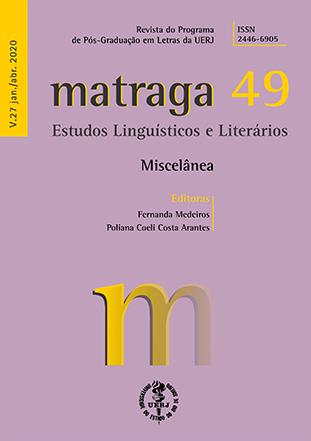Shakespeare: creator and creature
DOI:
https://doi.org/10.12957/matraga.2020.48110Keywords:
Shakespeare, progress, prestige, creator, creature.Abstract
During the apex and prestige of the theatre in the Elizabethan and Jacobean eras, William Shakespeare (1564-1616) was an author among many. After he retired in 1611, other playwrights went on writing plays which confirmed the well deserved reputation of excellence of this theatre. In 1623, the publication of the so-called First Folio, with the collection of all Shakespearean plays, kindled the interest in the playwright again. Nevertheless, the closing of the theatres in 1642 by the Puritan goverment caused enormous harm to the theatrical art, only recovering in 1660 with the return of Charles II to power. Shakespearean plays were not particularly popular during the Restoration. Slowly, from 1769 onwards, with the famous celebrations of the Jubilee of Shakespeare’s birthday at Stratford organised by the actor David Garrick Shakespeare began to be praised as national poet, and gradually, as global poet. He ís acclaimed as an exceptional creator of characters marking the literatures in the Anglo-Saxon and world cultures in an indellible way. Shakespeare himself is transformed from creator into creature in popular literature, announcer of several products and seller of others such as souvenirs. This essay aims at showing Shakespeare’s change of status as an author, from his relative disappearance during the Restoration to his actual national and world wide prestige owing to his outstanding creative capacity also pointing out another phase of his life – from creator of several works to creature by several creators.
Downloads
Downloads
Published
How to Cite
Issue
Section
License
Authorization
Matraga – Scientific Journal of the Post-graduate Program in Arts and Humanities of UERJ is authorized to publish the article submitted here, if it is accepted for online publication. It is attested that the contribution is original, that it is not being submitted to another publisher for publication, and that this statement is the expression of truth.
The works published in Matraga's virtual space – Scientific Journal of the Post-graduate Program in Arts and Humanities of UERJ will be automatically transferred, and your copyright is reserved to Matraga. Its reproduction, in whole or in part, is conditional on the citation of the authors and the data of the publication.

Matraga uses license Creative Commons - Attribution-Non-Commercial 4.0 International.





